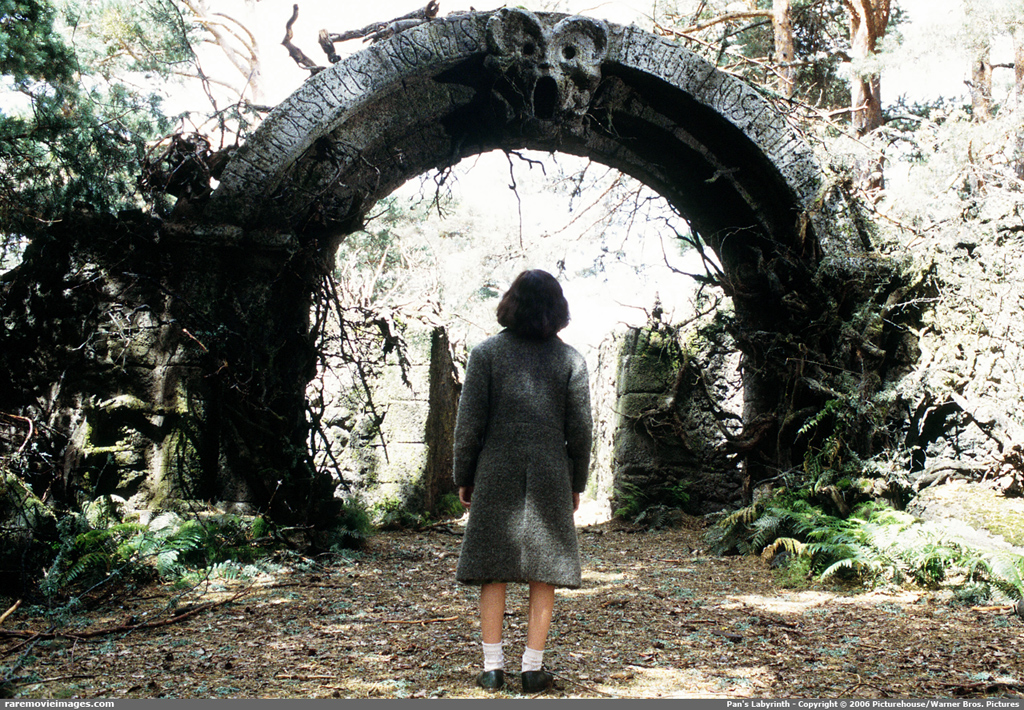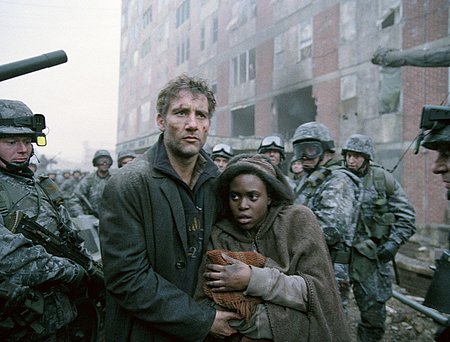
ENG441b
Contemporary American Literature, Fiction
Fantastic/Slipstream/Realism
Prof. Eileen Joy
Spring 2008
Wed 6:00-8:50 (Peck Hall 0302)

Figure 1. Still image from Guillermo del Toro's Pan's Labyrinth (2006)
". . . contrary to a deeply rooted belief, the book is not an image of the world. It forms a rhizome with the world, there is an aparallel evolution of the book and the world; the book assures the deterritorialization of the world, but the world effects a reterritorialization of the book, which in turn deterritorializes itself in the world (if it's capable, if it can). Mimicry is a very bad concept, since it relies on binary logic to describe phenomena of an entirely different nature. The crocodile does not reproduce a tree trunk, any more than the chameleon reproduces the colors of its surroundings. The Pink Panther imitates nothing, it reproduces nothing, it paints the world its color, pink on pink; this is its becoming-world, carried out in such a way that it becomes imperceptible itself, asignifying, makes its rupture, its own line of flight, follows its 'aparallel evolution' through to the end. . . . Write, form a rhizome, increase your territory by deterritorialization, extend the line of flight to the point where it becomes an abstract machine covering the entire plane of consistency." (Gilles Deleuze and Feliz Guattari)
"Realism . . . falls short of reality. It shrinks it, attenuates it, falsifies it; it does not take into account our basic truths and our fundamental obsessions: love, death, astonishment. It presents man in a reduced and estranged perspective. Truth is in our dreams, in the imagination." (Eugene Ionesco)
"Realism is a bad word. In a sense, everything is realistic. I see no line between the imaginary and the real." (Frederico Fellini)
COURSE DESCRIPTION
the fantastic: existing only in the imagination; proceeding merely from imagination; fabulous, imaginary, unreal; eccentric, quaint, or grotesque in design, conception, construction, or adornment; in literature and art, a liminal state of the supernatural
slipstream: fiction which, while not classified as science fiction, engages to some extent with scientific or futuristic subject matter; the common factor of this genre is some degree of the surreal, the not-entirely-real, or the markedly anti-real; "this is a kind of writing which simply makes you feel very strange; the way that living in the twentieth century makes you feel, if you are a person of a certain sensibility" (Bruce Sterling)
realism: the lifelike depiction of subjects, without embellishment or interpretation
In this course, we are going to explore--through the major works of some of the most significant writers and filmmakers of the last twenty or so years--the fictional genres of "the fantastic," "slipstream," and "realism." We will take as our starting point that the traditional definitions of these genres (noted above) leave much room for interpretation, and further, that each one of these definitions depends, to a certain extent, on the assumption that there is such a thing as an unmediated "real world" (whatever that might mean) and that, somehow, it is quantifiable, reachable, representable (and therefore, can also be opposed or refigured or transcended through other states of being and mind). Another concern of ours in this course will be to ruminate the artistic methods and aims of the individual authors whose works we will be reading: what kinds of worlds are they creating, and to what ends? In this respect, we will also be touching upon one of the chief questions of ontology: what kinds of beings make up the world? Finally, we will tackle the aesthetico-philosophical questions that impinge upon each of these works, whether more or less "realistic": what is the nature of "reality," and how does art (whether literary or visual) best convey or capture that nature? Is art itself "real," and in what way(s)?
As this is a senior-level literature course, preparing for and participating in class are vitally important to your ultimate success, and therefore, your contribution to in-class discussions as well as your attendance record will be factored into your final grade. Although I will provide much guidance and commentary, this is a discussion-, not a lecture-centered, course, and therefore students must come to class prepared with critical questions and comments related to the readings and films under discussion. As this is also a reading-intensive course, not keeping up with the reading could be extremely detrimental to your progress and final evaluation. One final (but important) word: coming to class without the text under discussion will be automatic grounds for dismissal from that particular class period (and will count as an absence).
REQUIRED RENTAL TEXTS (available at SIUE Textbook Service)
Paul Auster. Oracle Night: A Novel.
Kevin Brockmeier. Things That Fall from the Sky: Stories.
Jennifer Egan. The Keep: A Novel.
Nathan Englander. For the Relief of Unbearable Urges: Stories.
Amy Hempel. The Collected Stories of Amy Hempel.
Denis Johnson. Fiskadoro: A Novel.
Rick Moody. The Ice Storm: A Novel.
Lorrie Moore. Like Life: Stories.
Haruki Murakami. Hardboiled Wonderland and the End of the World: A Novel.
FILMS
Children of Men; The Dying Gaul; Pan's Labyrinth
COURSE REQUIREMENTS
1 CRITICAL PAPER, 10-12 pages, MLA-style format (50%)*
You are expected to develop your own, original topic and approaches; inclusion of secondary texts, critics, and ideas is required. This critical essay should deliver an original critical perspective and argument that takes up the themes of the course in relation to one or more of the primary literary texts we will have read this semester. Ideally, this paper should draw inspiration from the well of intellectual ideas encountered in class discussion, supplemented by additional secondary research (a minimum of five secondary sources). This paper can in NO way be what is called an "explanatory" research paper or "literature review" in which you simply provide an overview or summary of an author's work and/or career, or a survey of criticism on a particular author's work. To help you get started, go here for a working bibliography of sources relevant to the subjects under discussion in this course. For help with writing about literature, go here and here. For help with MLA-style research documentation and citation, go here.
*M.A. students will produce a paper of approximately 15-20 pages, with a minimum of 8-10 secondary sources
SHORT READING RESPONSES (40%)
To facilitate class discussion, you will write short responses (roughly in the neighborhood of 2-3 typed, double-spaced pages) to weekly readings. These short reading responses don't begin until after we've acclimated ourselves (typically in the third or fourth week of the course--see Schedule of Events below), and they are not due in the last few weeks of the course, in order to give you more time to devote to your critical paper. It is expected that, in these responses, you will critically engage the texts under discussion in relation to the theoretical concerns of the course (the nature of reality, the relation of art to reality, the differing and similar attributes of the fictional genres of realism/the fantastic/slipstream, the aesthetic techniques and subject matter of individual authors, etc.). These short responses will aid you in developing close reading skills and critical writing techniques that are crucial to your success with the longer critical paper, and it is imperative that these short responses NEVER do the following: a) merely summarize the reading; b) detail what you "like" or "don't like" about the reading, with no seriously critical commentary; c) evaluate the author's skill as a writer according to your personal aesthetic criteria; or d) use the reading as a point of departure for a discussion of something that has nothing to do with the reading or discussions in class.
Sample Response Papers:
Wading in the Slipstream: A Close Reading of Amy Hempel's "The Uninvited"
A Close Reading of Amy Hempel's "The Annex"
A Close Reading of Amy Hempel's "Nashville Gone to Ashes"
A Meditation on the Narrator in Rick Moody's The Ice Storm
The world is repeating itself. The story of the world is happening again: Apocalyptic Change in Fiskadoro
Dreams About Ghosts in Fiskadoro
A Precarious Relationship to the Past: Fiskadoro
Ghosts, Hauntings, and the Past in Fiskadoro
Problematic Levels: Incest and Bastards in Oracle Night
Cutting the Knot of Oracle Night
Oracle Night's Not/Happy Ending
More Chance in Paul Auster's Fiction
Nathan Englander's "Twenty-Seventh Man"
PARTICIPATION (10%)
As stated above under "Course Description," participation is vital to your success in this course. That means having a good attendance record, coming to class prepared to discuss the readings (with book or books in hand), and actively contributing to critically engaged conversations with your professor and peers.
LATE ASSIGNMENT POLICY
I do not accept late assignments. Period. If there is an extraordinarily good reason for needing an extension on a due date, let me know in advance, and we will work it out.
ATTENDANCE POLICY
Attendance, promptness, and participation are essential to success in college courses. Faculty members recognize that unexpected occasions may arise when a student must be absent from class, but my general attendance policy is that if you are absent more than the number of required class sessions per week (in this case, that would be more than 1 session), I have the option of lowering your final course grade by one letter grade for each additional session missed. Furthermore, if absences become excessive (more than two weeks' worth of sessions), the SIUE Registrar, at my request, reserves the right to withdraw you administratively. For more information on this, please consult the following: SIUE Class Attendance Policy. Failure to attend class in a responsible and committed manner may thus be grounds for failure in or administrative withdrawal from the course.
ACADEMIC DISHONESTY
Any student found engaging in an act of academic dishonesty will be promptly dismissed from the course with a grade of "F." By "academic dishonesty," I mean PLAGIARISM (the act of representing the work of another as one's own), which the University considers a grave breach of intellectual integrity. All definitions, terminology, concepts, and patterns of organization taken from an outside source must be identified and given credit in any essay or exam you write--whether it be for the English department or any other department. For more detailed information on this, please consult the following: SIUE Plagiarism Policy.

Figure 2. Still image from Alfonso Cuaron's Children of Men (2006)
SCHEDULE OF EVENTS (subject to revision as semester progresses)
"You want the truth and you want the truth and when you get it you can't take it and have to turn away. So is telling a person the truth a good or malignant act? . . . There was more to tell; there would always be more to tell. If I chose to tell him.
In the meantime." (Amy Hempel, from "Offertory")
| Wednesday | Jan. 16 | Introduction to Course |
| View: The Dying Gaul (film) | ||
| Tzvetan Todorov: What is the Fantastic? | ||
| Bruce Sterling, "Slipstream" (1989) | ||
| Wednesday | Jan. 23 | The Collected Stories of Amy Hempel (Reasons to Live & At the Gates of the Animal Kingdom) |
| "Sentence by Sentence" (interview with Amy Hempel) | ||
| Notes on Aristotle's Poetics | ||
| Sir Philip Sidney, Defense of Poesy | ||
| Not Again: 24 Films Too Painful to Watch Twice | ||
| Wednesday | Jan. 30 | The Collected Stories of Amy Hempel (Tumble Home & The Dog of the Marriage) |
| A Brief Interlude on Why the Humanities Do[n't] Matter, Which is Related to Whether or Not Fiction Bears Any Resemblance to Reality: | ||
| Stanley Fish, "Will the Humanities Save Us?" | ||
| Stanley Fish, "The Uses of the Humanities, Part II" | ||
| Joseph Kugelmass, "In Response to Stanley Fish" | ||
| Joseph Kugelmass, "Teaching Literature: The Meme" | ||
| Eileen Joy, "Tracks Leading to Various Aspects of Existence . . ." | ||
| Rebel Lettriste, "Why I Teach Literature Can Go Fuck Itself" | ||
| Wednesday | Feb. 6 | Lorrie Moore, Like Life |
| Moore, "Peed Onk: People Like That are The Only People Here" (handout) | ||
| "Moore's Better Blues" (interview with Lorrie Moore) | ||
| response paper due | ||
| Wednesday | Feb. 13 | NO CLASS -- PROFESSOR AWAY |
| Wednesday | Feb. 20 | Rick Moody, The Ice Storm |
| Rick Moody and Mary Gaitskill, "Sex, Capitalism, and Antidepressants" | ||
| Introduction to Romanticism | ||
| Realism in American Literature, 1860-1890 | ||
| Naturalism in American Literature | ||
| response paper due | ||
| Wednesday | Feb. 27 | View: Children of Men (film) |
| James Berger, "Trauma and the End of the World" (handout) | ||
| Synopsis: P.D. James, Children of Men | ||
| "For me, Children of Men is a model of a kind of materialist subversion of a reactionary classic, because the novel is obviously a spiritualist Christian parable of resuscitation, bringing new life and so on. The novel ends with baptizing. It’s clear Christian parable. The film is a model of how you can take a reactionary text, change some details here and there and you get a totally, a totally different story. I would say that it’s a realist film, but in what sense? Hegel in his aesthetics says that a good portrayal looks more like the person who is portrayed than the person itself. A good portrayal is more you than you are yourself. And I think this is what the film does with our reality. The changes that the film introduces do not point toward alternate reality, they simply make reality more what it already is. I think this is the true vocation of science fiction. Science fiction realism introduces a change that makes us see better. The nightmare that we are expecting is here." (Slavoj Zizek on Children of Men) | ||
| Slavoj Zizek on Children of Men (YouTube) | ||
| Zizek on Children of Men (I Cite) | ||
| Wednesday | Mar. 5 | Denis Johnson, Fiskadoro |
| Annie Dillard, "Can Fiction Interpret the World?" & "Does the World Have Meaning?" (handout) | ||
| Apocalytpic and Post-apocalytpic Fiction | ||
| response paper due | ||
| Wednesday | Mar. 12 | NO CLASS -- SPRING BREAK |
| Wednesday | Mar. 19 | Paul Auster, Oracle Night |
| "Thoughts are real," he said. "Words are real. Everything human is real, and sometimes we know things before they happen, even if we aren't aware of it. We live in the present, but the future is inside us at every moment. Maybe that's what writing is about, Sid. Not recording events from the past, but making things happen in the future." (Oracle Night, pp. 221-22) | ||
| Brian McHale, "Chinese-Box Worlds" (handout) | ||
| "The Book of Paul Auster" (interview with Paul Auster) | ||
| Andie Miller, "Reflections on Glass" | ||
| response paper due | ||
| Wednesday | Mar. 26 | Nathan Englander, For the Relief of Unbearable Urges |
| response paper due | ||
| Wednesday | Apr. 2 | View: Pan's Labyrinth (film) |
| Brian McHale, "Worlds Next Door" (handout) | ||
| Project Narrative: Mark Danielewski Events (moderated by Brian McHale) | ||
| Wednesday | Apr. 9 | Kevin Brockmeier, Things that Fall from the Sky |
| Thomas Pavel, "Salient Worlds" (handout) | ||
| "Works of fiction more or less dramatically combine incompatible world-structures, play with the impossible, and incessantly speak about the unspeakable. Yet they most often present themselves as linguistically coherent texts, gently obeying stylistic and generic conventions, and it is no small feat that we manage to put together heterogeneous sets of fictional worlds in unified, beautifully varnished texts, and to make sense of the tension between texts and worlds." (Pavel, p. 62) | ||
| Thursday | Apr. 10 | LECTURE: Joseph Carroll, "Consilience and Human Nature" (7:00 pm, Morris University Center, Oak/Redbud Room) |
| Wednesday | Apr. 16 | Jennifer Egan, The Keep |
| Madison Smartt Bell, "Into the Labyrinth" (review of The Keep) | ||
| Wednesday | Apr. 23 | Haruki Marukami, Hardboiled Wonderland and the End of the World |
| Wednesday | Apr. 30 | Haruki Marukami, Hardboiled Wonderland and the End of the World |
| "The Outsider" (interview with Haruki Murakami) | ||
"One of my all-time favorite jazz pianists is Thelonious Monk. Once, when someone asked him how he managed to get a certain special sound out of the piano, Monk pointed to the keyboard and said: 'It can’t be any new note. When you look at the keyboard, all the notes are there already. But if you mean a note enough, it will sound different. You got to pick the notes you really mean!' I often recall these words when I am writing, and I think to myself, 'It’s true. There aren’t any new words. Our job is to give new meanings and special overtones to absolutely ordinary words.' I find the thought reassuring. It means that vast, unknown stretches still lie before us, fertile territories just waiting for us to cultivate them." (Haruki Murakami, "Jazz Messenger") |
||
| Tuesday | May 6 | Critical Paper Due (paper must be dropped off at my mailbox just outside Peck Hall #3206 by 5:00 p.m.) |

Figure 3. Roman copy of The Dying Gaul, a 3rd-century BC bronze statue